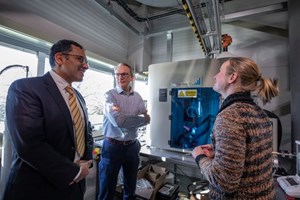News
UKAEA and CNL partner to accelerate fusion energy development
The United Kingdom Atomic Energy Authority (UKAEA) and Canadian Nuclear Laboratories (CNL) have signed a collaboration framework agreement to partner on the development of technologies in relation to the management of tritium, a fusion energy fuel.
This agreement complements the signing today of a Memorandum of Understanding by the UK’s Energy Secretary, Claire Coutinho and Canadian Minister of Energy and Natural Resources, Jonathan Wilkinson at the International Energy Agency’s (IEA) Ministerial meeting.
The UK-Canada Memorandum of Understanding enhances collaboration on key focus areas, including research and development, regulatory harmonization, and skills and workforce development.
Stephen Wheeler, UKAEA Executive Director said, “Fusion energy promises to be a safe, low carbon and sustainable part of the world’s future energy supply. Tritium is a key fuel for fusion energy, and developing a commercial scale fuel cycle for the handling and reprocessing of tritium is vital to the delivery of fusion as a clean energy source.”
“This collaboration between UKAEA and CNL brings together two of the largest and most experienced tritium research and operational teams in order to accelerate the development of new technologies for tritium processing,” said Wheeler.
A key focus of the partnership will be on H2 isotope management within the fusion fuel cycle safely removing, processing and reinjecting fuel to the plasma in a continuous manner. H2 isotope management is an essential part of the fusion fuel cycle – tritium needs to be separated from other H2 isotopes in the exhaust gas so that it can be recycled and reused as a fusion fuel. Tritium is rare in nature, so managing tritium efficiently is crucial to fusion energy’s commercial viability.
The first project under this collaboration will involve samples of candidate materials for isotope separation being analyzed at both CNL’s facilities in Chalk River, Ontario, and UKAEA’s facilities in Culham, Oxfordshire.
“CNL has a proud history of working alongside the United Kingdom to advance clean energy technologies, and this agreement builds on that relationship, to pursue fusion technologies, a transformative clean energy solution for our respective countries,” said Jeff Griffin, Vice-President, Science and Technology, CNL.
“For our part, CNL has extensive expertise in the safe operation of facilities, storage and management of tritium, capabilities that will be critically important to this collaboration. Overall, we are thrilled to work with such a talented and internationally respected team of researchers at the UKAEA, and we cannot wait to get started,” said Ian Castillo, Head of H2 and Tritium Technologies, CNL.
The UK-Canada collaboration builds on the announcement of the UK-US Strategic Partnership on Fusion Energy in November 2023 and will support the UK’s £650-MM Fusion Futures program, which is ensuring the UK remains at the cutting-edge of innovation – with training opportunities and dedicated funding for fusion companies.
The UKAEA and CNL agreement establishes a framework in which the two organizations will conduct joint research projects, facilitate personnel secondments, share expertise for consultancy services, and work together to provide services to the fusion industry.
Both UKAEA and CNL facilities will also be leveraged in this partnership to advance tritium technologies required for fusion applications, including the design of tritium processing plants, tritium-compatible materials development, tritium breeder blanket technologies, tritium decontamination, and analytical equipment and the modeling of tritium handling processes.


